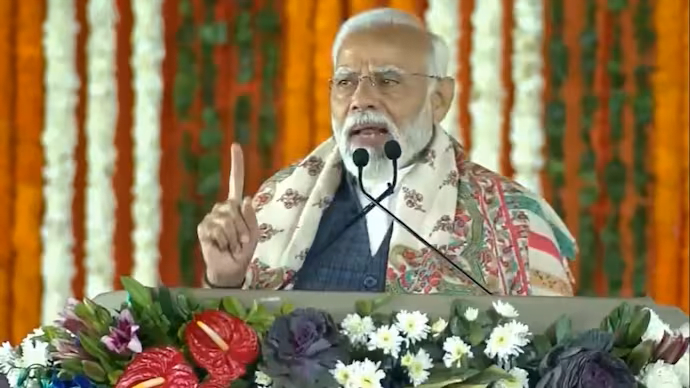
Apeksha Agarwal
Prime Minister Narendra Modi made a significant visit to Jammu & Kashmir on Tuesday, February 20th, marking a pivotal moment in the region’s journey towards progress and prosperity. The visit was underscored by a series of groundbreaking announcements aimed at catalyzing comprehensive development across various sectors.
During his visit, Prime Minister Modi inaugurated a slew of development projects totaling a staggering Rs. 32,000 crore. These projects encompassed crucial areas such as education, healthcare, infrastructure, transportation, petroleum, and aviation, signifying a holistic approach towards uplifting the socio-economic landscape of Jammu & Kashmir.
Among the notable highlights of the inauguration ceremony was the unveiling of the first electric train, symbolizing a leap towards sustainable and modernized transportation infrastructure in the region. Additionally, the inauguration of the IIT Jammu complex heralds a new era of academic excellence and technological advancement, laying the foundation for nurturing future generations of innovators and leaders.
Vision behind the project
Addressing a captivated audience, Prime Minister Modi underscored the significance of Article 370 and reiterated the government’s commitment to harnessing the untapped potential of the region. Emphasizing BJP’s vision for the upcoming 2024 elections, he outlined a roadmap for inclusive development that encompasses every stratum of society.
Amidst the ceremony, Prime Minister Modi made a historic announcement by distributing approximately 1500 appointment letters to individuals selected for government jobs from Jammu and Kashmir. This gesture not only signifies the government’s dedication to providing employment opportunities but also empowers the local populace to contribute actively to the region’s development.
Prime Minister Modi’s address resonated deeply as he unveiled various transformative projects and schemes, including the ‘Viksit Bharat Viksit Jammu’ program, aimed at bolstering the region’s infrastructure and economic landscape. The highlight of the event was the announcement of the IIT complex, which elicited a wave of enthusiasm among the audience.
The proposed IIT complex is envisioned as a beacon of academic excellence, equipped with state-of-the-art facilities including 27 lecture halls, 52 labs, and 104 faculty offices. Accommodating 1,450 students with comprehensive hostel facilities, the complex is poised to emerge as a premier educational institution in the region.
In addition to the IIT complex, Prime Minister Modi unveiled plans for the establishment of IIMs in Jammu, Bodh Gaya, and Vishakhapatnam, further bolstering the region’s educational landscape. Moreover, the announcement of 20 new buildings for Kendriya Vidyalayas and 13 for Navodaya Vidyalayas underscores the government’s commitment to enhancing access to quality education.
The infrastructural development agenda also witnessed significant strides, with Prime Minister Modi laying the foundation stone for the first five Kendriya Vidyalaya campuses. Furthermore, the inauguration of AIIMS, spanning across 227 acres and constructed at a cost exceeding 1,660 crores, represents a monumental step towards addressing the region’s healthcare needs.
With 720 beds, a medical college, nursing college, and an AYUSH block, AIIMS is poised to revolutionize healthcare delivery in Jammu & Kashmir, catering to the diverse healthcare requirements of its populace.
Prime Minister Narendra Modi’s visionary initiatives have set Jammu & Kashmir on a transformative path towards becoming a beacon of educational excellence and a thriving business hub. As these projects take shape, they promise to unlock the region’s immense potential, fostering inclusive growth and prosperity for generations to come.

